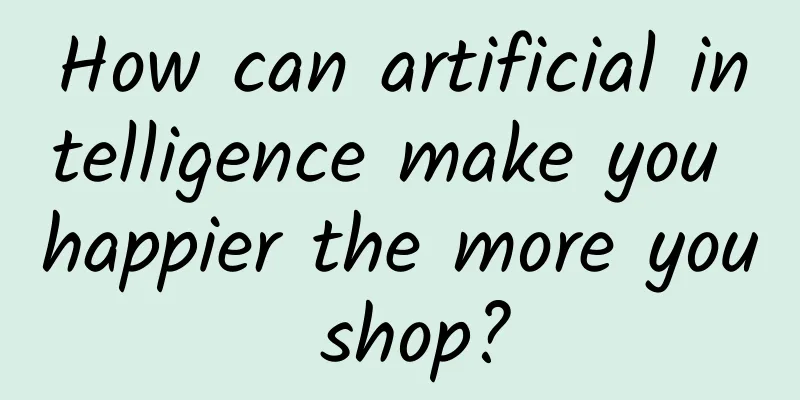How can artificial intelligence make you happier the more you shop?

|
lead We have talked about autonomous driving, smart homes, smart healthcare, etc. These AI applications have one thing in common: helping humans creatively solve problems that have clear answers, and there are quantitative criteria for judging whether the solutions are good or bad. However, what I am going to talk about today is a very different issue - how AI can participate in online shopping. Its special feature is that AI needs to face a very tricky problem: when the interests of buyers and sellers conflict, which side should AI stand on? Picture丨TuChong Creative Before we delve into this issue, let me share with you a set of interesting data. The data comes from PwC's newly released "2021 Global Consumer Insights" [1]. Survey data shows that in the past 6 months, consumers in other countries are more concerned about the price of goods than consumers in my country. Moreover, this is not the case that underdeveloped countries are lagging behind developed countries. Even if China is compared with developed countries such as Germany, France, Japan, and Singapore, this conclusion still holds true. This data is a bit counterintuitive. According to our understanding, developing countries with low per capita income are more likely to be attracted by commodity prices. Germany and Japan should pay more attention to the quality of commodities and the impact of commodities on health and the environment. However, the report shows that among all the countries surveyed, Chinese consumers are the most concerned about health and ecological environment. Another interesting data is that Chinese consumers are the most optimistic about the future economic situation among all countries. PwC did not give a specific interpretation of these data in the report. After looking up some information online, I have a humble opinion that this may have something to do with my country's relatively advanced online shopping environment. The current situation of online shopping in my country According to the 2020 China E-commerce Report, my country’s total e-commerce transaction volume has exceeded RMB 37 trillion, with online retail business reaching nearly RMB 12 trillion, accounting for 31.6%[2]. You may not know what this means? In fact, you will be shocked if you compare: the United States, which ranks second in the world, has only created about US$100 billion in online retail transaction volume after experiencing a surge in online transactions caused by the COVID-19 pandemic, which is not even a fraction of China’s[3]. I guess China’s total transaction volume is roughly equivalent to the sum of all foreign countries. The picture shows the transit warehouse of a logistics company in Linyi. One of the important reasons for the development of our e-commerce is the development of logistics. On Taobao alone, there are more than one million products that can be delivered to your home for less than 10 yuan [4]. In addition to logistics, online shopping also provides a large number of cheap goods, and similar products often have a large price gradient for consumers to choose from. Therefore, Chinese netizens have long been accustomed to price incentives and are even a little numb. For example, when I receive messages about coupons, red envelopes, etc. on my mobile phone, I always turn them off without even reading them. Therefore, consumers in developed countries have not experienced the promotion frenzy brought about by online shopping. Instead, they are more sensitive to factors such as price and saving money than Chinese consumers. No middlemen making a profit from the price difference? How can millions of products be delivered to your home for less than 10 yuan? You may answer without hesitation: it is nothing more than "direct sales from the manufacturer, no middlemen make a profit from the price difference". For many years, the phrase "no middlemen to make a profit" has provided a strong explanation for the development of online shopping. Many consumers also take it for granted that the goods sold directly from factory stores are indeed of high quality and low price. But I want to tell you that this phrase only sounds reasonable. In many cases, if you want to make goods cheaper, not only can you not reduce the number of middlemen, but you even have to deliberately increase the number of middlemen. Let me tell you an example. Fruit farmer Lao Wang grows pear trees in the whole village, and he has five pear trees at home. When the pears are ripe, Lao Wang drives a tricycle to sell the pears at the nearby market. Because he can use the slogan "fruits from farm trees, freshly picked and sold", his business is pretty good, and he can get a relatively high price of 5 yuan per catty. This can be considered a legitimate sale without middlemen making a profit. However, Lao Wang’s sales ability is limited after all. No matter how hard he tries, he can’t sell all the pears. So he chooses to sell the remaining pears to fruit wholesalers. Fruit wholesalers buy pears from the whole village at 0.5 yuan per pound, and then wholesale them to fruit stores at 1.5 yuan. So, we can buy pears at 3 yuan per pound in the fruit store. Therefore, there are two layers of distributors between the fruit farmers and consumers, but the price has dropped by 2 yuan. In order to speed up sales, fruit wholesalers also put pears on group buying platforms and sold them at an average price of 2 yuan per pound. The group buying platform and offline pickup stations will charge 20% and 10% commissions respectively. At this time, the number of middlemen between fruit farmers and consumers has increased to three layers, but the price of pears has dropped to 40% of the original price, saving consumers 3 yuan. Trading resistance This is a very interesting phenomenon. Don’t fruit shops want to sell pears at a higher price than Lao Wang? Of course they want to, but Lao Wang is a fruit farmer himself, and the unsold pears are guaranteed to be purchased by wholesalers. Of course, he doesn’t care about sales volume, but only about profits. But fruit stores can't do this. They buy their fruits with money, and if they can't sell them quickly, they will lose money. They need to consider the prices of other fruit stores and understand the psychology of consumers. This leads to their final prices being lower than the direct sales prices of fruit farmers. Therefore, eliminating the middleman to make a profit from the price difference cannot solve all problems. The most optimized transaction chain is not necessarily the shortest path between the two. Most of the time, the path with the least transaction resistance is the best path. Both merchants and e-commerce platforms have been working hard to eliminate transaction barriers. In order to increase the payment rate of buyers, online payment has changed from entering passwords to face recognition and fingerprint payment. Later, small-amount password-free payment was opened, and purchases can be made directly with one button, without even face recognition. Picture丨TuChong Creative Artificial intelligence is also trying to understand buyers’ needs based on their behavior. For example, when buyers try different keywords repeatedly on a shopping website for a long time, artificial intelligence not only needs to understand the meaning of the current keyword, but also needs to guess the buyer’s real needs based on the keywords previously entered. If a buyer always browses the same category of goods repeatedly, artificial intelligence will try to understand the buyer’s thoughts: Does he think the price is not right? Or is the color and style of the product not to his liking? With these evaluations, artificial intelligence can adjust the order of goods and place the goods that buyers are most likely to buy in the places where they can see them most easily. Every innovation and invention of online shopping platforms is to reduce or eliminate transaction resistance and make transactions smoother. The role of artificial intelligence Nowadays, e-commerce platforms have accumulated a huge amount of user behavior data. These data often make consumers feel that in order to satisfy our shopping desires, we have given up almost all our privacy. Although the products have become more abundant and the resistance to transactions has indeed decreased, we always have a sense of anxiety that we are firmly controlled by the e-commerce platform after we complete the shopping. After all, artificial intelligence is developed by the platform. As the party with vested interests, the e-commerce platform will definitely pursue the maximization of transaction volume. How can it stand on the side of consumers? However, this understanding is not correct. Although there is indeed a bargaining relationship between buyers and sellers in terms of price, quality, service, etc., this bargaining relationship is actually caused by information asymmetry between the two parties. For example, when the seller knows the quality of the product better than the buyer, the buyer must be extra careful to avoid being cheated. When third-party guarantees, seven-day unconditional returns, and brand certification emerge, the information asymmetry caused by quality is eliminated, and the game between buyers and sellers based on quality issues no longer exists. For example, when the seller knows the cost of the product better than the buyer, the buyer has to shop around before placing an order. However, the emergence of price comparison technology eliminates the information asymmetry caused by price, and buyers and sellers no longer need to bargain. Sometimes too much information can also cause confusion for consumers. Take food e-commerce as an example. In order to be ranked first when buyers search for low-priced goods, many sellers are very keen to sell small-packaged products. Because the smaller the package, the lower the absolute price, so it can be ranked higher in the list sorted by price. However, due to the different packaging of similar products, it is difficult for buyers to figure out which store is cheaper for the same weight of food. Why are Yanxuan, content e-commerce, and live streaming more popular as the number of goods sold online increases? The reason is that information overload creates new resistance for buyers and sellers. To put it bluntly: people have too many choices. For consumers, instead of struggling helplessly in the vast ocean of commodity information, it is better to just listen to the recommendations of the beautiful anchors or Lao Luo. Unfortunately, the anchors will only give priority to selling the things that are most profitable to them, rather than giving priority to selling the things you need most. In fact, as long as artificial intelligence can understand the information of the goods, using a button to sort by unit weight can eliminate the information asymmetry caused by non-standard product information. Therefore, the game between buyers and sellers is not a zero-sum game of life and death. Based on understanding the needs of both buyers and sellers, artificial intelligence can completely eliminate information asymmetry and make the transaction a win-win situation. Future scenarios Let’s imagine together what it will be like 10 years from now when artificial intelligence is deeply involved in online shopping. If artificial intelligence completely eliminates the information asymmetry between buyers and sellers, what will online shopping become? August 24, 2031, is Xiaoli's birthday and the annual Chinese Valentine's Day. Xiaoli got up early in the morning and rushed to the door to check the express delivery. Sure enough, she received the package she had been looking forward to for 3 days as expected. Just a few days ago, Xiaoli received a message. It turned out that the most famous custom fashion factory in China applied for Xiaoli's body information. It turned out that Xiaoli's boyfriend Xiao Zhang wanted to customize a set of clothes for her, and the delivery time was set on the morning of the Chinese Valentine's Day (on time). Although she knew that the gift was a set of clothes, when Xiaoli opened the package, she was still so surprised that she almost screamed. It turned out that this was exactly the set of clothes worn by the heroine in a web drama that she was fascinated with recently. She once mentioned to her boyfriend Xiao Zhang inadvertently that she liked this dress. Unexpectedly, her thoughtful boyfriend turned this dress into a surprise for the Chinese Valentine's Day (customized). At noon, Xiaoli finished her lunch early and held her phone in her hands, waiting for something. It turned out that she was waiting for a "5-minute birthday" event (privilege) specially prepared by a shopping website for users who have birthdays on that day. In these 5 minutes, the shopping website will compile a wish list of the products that Xiaoli has paid the most attention to in the past year but has not purchased. The products on the wish list will be greatly reduced in price. As long as Xiaoli completes the payment within 5 minutes, she can get a discount that is difficult to get on weekdays. This is Xiaoli's exclusive shopping festival. A total of 20 items appeared on Xiaoli's wish list, most of which were things Xiaoli really wanted. Xiaoli did not waste the opportunity and bought 15 of the 20 items (precision). Dinner was a two-person world for Xiaoli and her boyfriend. As expected, the restaurant arranged a window seat with the best view for Xiaoli in advance, and also thoughtfully sent her a birthday cake. Xiaoli, who loves food, was moved by the taste of the cake. She immediately took out her mobile phone and took a few photos of the cake. She didn't want to post it on WeChat Moments, she was entrusting her shopping assistant to help her purchase all the ingredients for making the cake (at any time). In the evening, when Xiaoli returned home, she received a lot of packages, 15 of which were from the wish list at noon, and the other few were the ingredients for making small cakes (efficient). The essence of online shopping During Xiaoli's day, the most classic online shopping scenarios - searching for products, understanding details, checking reviews, and comparing prices - did not appear once. This is because these are functions designed to reduce information asymmetry. If artificial intelligence can accurately understand the real needs of buyers and sellers, then these functions become less important. When we talk about shopping, we often say: "Enjoy shopping." But most people probably don't know why shopping makes people happy. Picture丨TuChong Creative Consumer psychologist Giano pointed out in her research[5] that the overly detailed division of labor in modern society is depriving people of their sense of control over specific things. When people lack a sense of control, they will feel anxious. Shopping is an activity that allows people to regain a sense of control. All you need to do is choose the product you want to buy and then place an order to buy it, and you can be very sure that you have what you want. Another study[6] found that shopping not only makes people happy, but can even help overcome lingering sadness. In PwC's "Global Consumer Insights 2021" report, the reason why Chinese people are more optimistic about the future economic situation than the rest of the world may be because the Chinese economy did perform better during the epidemic. Another reason is that the environment where all kinds of goods can be purchased online anytime and anywhere makes our character more positive and optimistic. Conclusion The famous artist Andy Warhol once praised Coca-Cola, saying: "Coke is Coke. There is no difference between better and more expensive. The richest and the poorest enjoy the same thing." Decades ago, Coke was indeed worthy of such praise. Because at that time, the quality of goods was highly related to status. It often took several years or even decades for a commodity to gradually spread from the nobility to the common people. Now, online shopping is constantly driving the manufacturing industry to quickly turn a large number of goods into mass commodities like Coke. Even completely personalized and customized products have lost their high-end titles. Although the wealth owned by the poor and the rich is still very different, more and more people are beginning to live a life of similar quality. In reality, if you can get a more intimate shopping experience on a shopping platform at the cost of opening up more behavioral data to their artificial intelligence, would you be willing to do so? I really want to hear your opinion. You are welcome to write your thoughts in the comments section. See you there. Source https://www.pwc.com/gx/en/industries/consumer-markets/consumer-insights-survey.html https://baijiahao.baidu.com/s?id=1702002642588544248&wfr=spider&for=pc https://www.ebrun.com/20210222/422840.shtml Search for free shipping products on Taobao and limit the maximum price to 9.9 yuan. Each subcategory has 100 pages, that is, 4,000 products are displayed. I simply investigated 30 small category keywords, and each has 100 pages of products. So roughly speaking, there are 1 million products within 10 yuan. https://www.apa.org/members/content/yarrow-unlocking-shopping-behavior https://www.sciencedirect.com/science/article/abs/pii/S1057740813001149 Author: Wang Jie Source: Science Voice |
<<: Nobita's dinosaur turns out not to be a dinosaur at all?
>>: Where does the human tissue removed during surgery go?
Recommend
How to design a good online h5 game?
This article mainly analyzes online mini -game ca...
In Xinjiang, I saw the legend of "a thousand years of standing"
On the shore of Lop Nur Lake in Xinjiang Uygur Au...
With fossils being unearthed one after another, China's "paleoanthropology" is becoming more and more "new"!
In July 2024, the China Association for Science a...
What are server logs? How to read the server log?
Although many webmasters now understand search ra...
Waymo, the world's leading autonomous driving company under Google, has entered China. Can Baidu win again?
Amid the endless stream of news events, the news ...
Notice of the 2015 China Mobile Medical Industry Forum
Based on the current mobile Internet technology, ...
Code to handle iOS horizontal and vertical screen rotation
1. Monitor screen rotation direction When dealing...
A review of the top 10 Douyin e-commerce cases of the year!
Douyin e-commerce in 2021 is like the American We...
Kuaishou Operation Guide
Kuaishou Operation Guide 1. Understanding the Kua...
Introduction to the Systematization of Portrait Photography Post-production
Introduction to the systematic entry resources fo...
How much of the oily fish known as "Splatoon" should you eat every day to be safe?
Today is Monday. According to my experience, peop...
Every year, 650,000 people die from influenza worldwide, while tuberculosis kills 1.25 million!
In this issue, let’s talk about tuberculosis and ...
Nut Pro 2: The Smartisan smartphone may not get a perfect score, but it is still enough to teach fellow manufacturers a lesson
Nut Pro is not only the best-selling product in t...
Teach you how to write high-quality brainwashing copy
"I won't accept any gifts this year, but...
15 essential data analysis methods for operations
When it comes to data analysis , people often thi...









